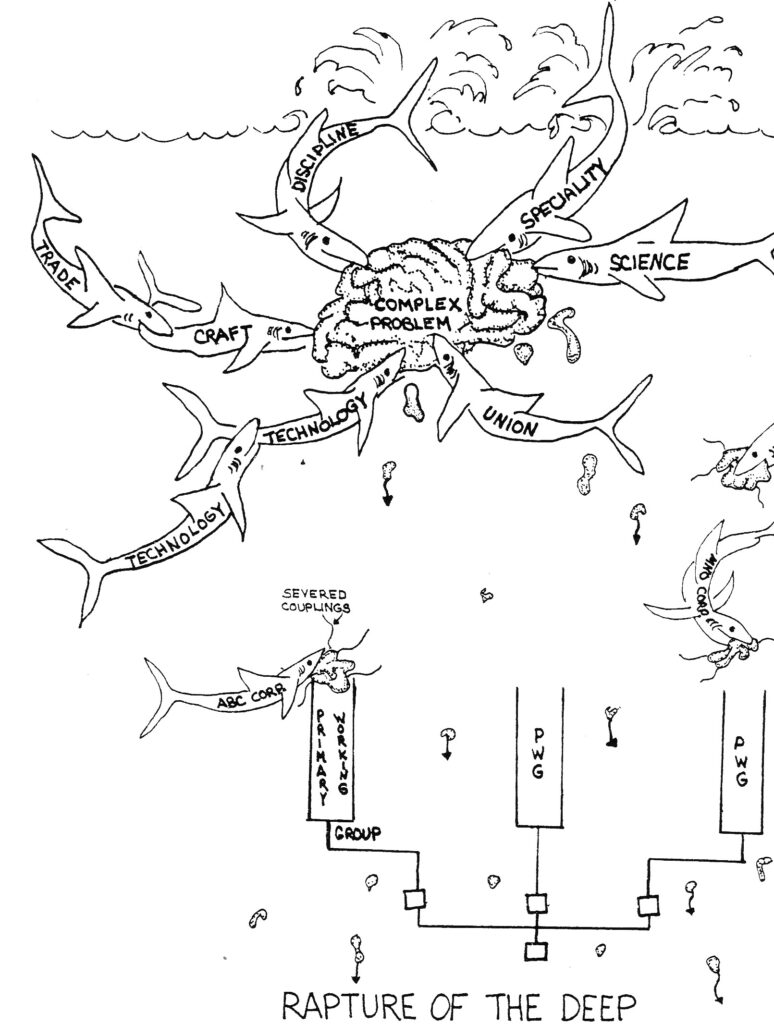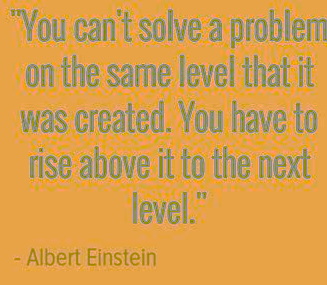The system perspective on social reality
Reality pours in every day from around the globe affirming society’s freely-made choice to self-destruct. The choice between languishing and flourishing made by hierarchical society is beyond dispute. In hindsight, it is obvious that society chooses self-annihilation. When Plan B became operational in 2013, it provided the missing framework for scoping and measuring the ravages of business as usual on the population. It is clear that society navigates by values it places higher than survival of its own species, POSIWID. Everyone knows by personal experience it’s impossible to deceive POSIWID.
There is little conjunction of truth and social reality. Around us are pseudo-events, to which we adjust with a false consciousness adapted to see these events as true and real, and even as beautiful. In the society of men the truth resides now less in what things are than in what they are not. Our social realities are so ugly if seen in the light of exiled truth, and beauty is almost no longer possible if it is not a lie. Can we do more than sing our sad and bitter songs of disillusion and defeat? The “fix” to social dysfunction requires more than a passionate outcry of outraged humanity. Ronald D. Lange
The free choice to self-destruct is not simply explained. The rise and fall of civilizations all over the planet has played out since the ice age ended 12K years ago – no exceptions. The “Age,” from bronze to microchip, made no difference. These have to be innate human values and druthers in play. The simple fact that civilizations rose proves social systems are capable of flourishing. Why do scholars only study civilization declines?
The social “system” has many components in relationship with each other, materially and entangled, note:
- The system issue has increased in severity over time in spite of significant efforts made to curtail its consequences.
- No bureaucracy, science, or discipline takes responsibility for solving system problems or for reducing their consequences.
- All inroads made towards a system solution are partial and transient.
- Hedging their promises, all remedial efforts project long times (years) to stay the course, for a full, sustainable system solution. It never happens.
Examples of social-system issues currently raging out of control
- Organizational dysfunction
- Health
- Poverty, homeless
- Education
- Class warfare
- Loss of inalienable rights
- Corruption
- Climate
- Potable water
- Ecosystem sustainability
To name a few.

Natural law aversion
Only a small fraction of the population knows much about the natural laws, the indifferent laws that run the universe. Shrouded in magic, natural law, aka mathematical physics, are held to be alterable by divine intervention. The Establishment conditions its people to think that with enough will, piety, and perseverance, natural laws can be defied by humans, the chosen ones, and no other species.
The ancient quest for perpetual motion was still in vogue a hundred years ago. Rattled by E=mc2, attempted defiance of the conservation laws continued to the 1950s. You can still join the Flat Earth society today.
While natural laws are embraced by ecologists to bolster their sounds of alarm, the public readily accepts that humans and their social systems are indeed ecosystems. At the same time the public holds that, for humans, natural laws are provisional and, given determined effort, can be defied to order.
The upshot of this global delusion is that the population doesn’t believe the laws of nature apply to the human species. This opens a large Pandora’s Box. The continuous attempts made by human collectives to defy the laws of nature is sufficient, by itself, to account for the societal malfunction humans endure.
System knowledge is 2% about configuration and 98% about its dynamics.
Reductionism: Kryptonite to system think
When society treats what is a system issue by reductionism, business as usual, the cause is lost and buried. With a bona fide system affair, there is nothing to navigate by, no success reference as destination. Hierarchical social systems have been guilty of this miscarriage of common sense for centuries, learning nothing from their incessant failures.
When the system is forcibly fractured by science to fit established silos of science, parts of the system fall though the gaps and get lost. When discipline efforts prove to be futile against the target system, the response is always to increase the granulation. That’s how system problems don’t get solved.

No one benefits from the reductionist approach. What this cycle of endless failure does is infuse and magnify fear that the system problem is unsolvable. Fear is the currency needed by a corrupt Establishment to stay in business. It does no good to make believe the failure of reductionism on social system malfunction can be fixed by adding resources. The system laws that rule system matters bend for no one.
So, if standard reductionist practice does not work on system matters, what does? You will not like the answer. First, you have to admit you’re screwed and carry on, facing the facts. You must stop wasting valuable energies in chasing after pieces and parts that cannot be treated independently. As the psychiatrist R.D. Lange did in 1938 with the inhumane treatment of psychotics, helplessly incarcerated in institutions.
He stopped the standard practices going on, they were ineffective anyway, and redirected efforts to finding strategies that brought tangible improvements to their patients. He installed the process of elimination (POE) to test ideas for a fix, to discard what didn’t work, and to conjure up another fix that might. He quickly proved that the sanity of the hospital staff, by using practices known to fail, was little saner than their psychotic patients.
Our experience showed the reality-centeredness of the folks using reductionist methods on system problems to be no different in principle than the reality-deniers of entitled consumers. Nature punishes those who attempt to defy her laws with vigor and without remorse. She is deaf to persuasion.
A classic example of reductionism tempered with political-bias blindspots has been going on in recent years with ecosystem science. After the idea of the keystone species was established in 1980 and it was discovered that the Establishment was neutral about the knowledge of social behavior of ecosystems, study of the laws of ecosystem dynamics took off. If you could tie your “cause” to ecosystem science, you were free to apply natural law and the facts of reality without losing your job.
In due course, the idea that ecosystems were interaction networks latched in and the mathematical physics of networks gained prominence. Ecological interaction networks were modelled with network math and the excellent correlation of the models with reality sealed the deal. The published literature abounds with studies of ecosystem complexity, connectance, clustering, compartmentalization, nestedness, and trophic coherence – to name a few. Research goals were set to measure ecosystem stability, fragility, and resiliency – basic system control theory.
There is no way for an honest man to study the social phenomena of ecosystem dynamics and not make the connection between kelp bed ecosystems and human ecosystems. For example, the terms compartmentalization and nestedness are fully equivalent to the silos in hierarchical human society. Although no one objects to calling social systems ecosytems, in no instance has any science mentioned that human society is dynamically like any other ecosystem, behaving according to the same mathematical physics and not the whims of the ruling class. The political bias in ecosystem science is no different than what medical science did harming the population with the Chinese pandemic.
The tough love of an indifferent Nature
The process of elimination (POE) in system matters is brutally frustrating. While you learn what doesn’t work, the data you collect on your failures points nowhere. Until you have a validated, generic fix, you don’t even know the full scope of the cascade of consequences you’re trying to eliminate. Until you have experience with the implemented fix, you have no idea of the beneficial functionalities that were buried by organizational dysfunction (OD). You learn that no one had ever experienced these wonderful functionalities before or knew they emerged automatically when Plan B is installed.
Even though the POE runs in tighter and tighter circles as strategies are eliminated by failures, the attainment of the fix remains a matter of luck. The fix cannot be forced. It can only be recognized when it gels in implementation.
Since the entire matter of social dysfunction is psychological, there is no inertia, the system fix is instant. If it’s not on, it’s off. There are no part scores, no graceful degradations. If you actually had a close call, you’d never know it. Deciding the POE is “too much trouble” is accepting defeat. Avoiding cognitive effort is a very popular choice.
The record is compelling: to have a true systems problem and apply reductionism instead of systems practices is to abandon any chance for finding a lasting solution. It is refusing to take responsibility for solving the system problem in order to retain imagined herd security. This principle is incorporated in the conditions of license for Professional Engineers (PE), requiring withdrawal from the engagement in cases of reality denial.
To apply reductionism on a system issue is to fail. If it is a system issue, you must solve the problem before the system can be dynamically understood. The only process to go from data to solution is the laborious process of elimination. Reductionism, no matter how popular or much is applied, cannot help but fail. Further, reductionism conceals the attainable, but unexperienced, benefits from solving the system dysfunction problem that have never before been experienced.
It is a grievous blunder to treat a malfunctioning system by reductionism. All your efforts at dissecting the problem, regardless of your intentions, only make matters worse. It is likewise an established fact and terminal error to treat another human being, a system of systems with reductionist practices. It obliterates his identity.
Depersonalizing an individual takes away his experience, the platform on which he acts, infusing anxiety and disorientation in him every step of the way. It is a hostile act and he reciprocates. Everyone has experienced this scenario and involuntarily acted the same
Depending on how you count systems, there are dozens and hundreds of systems contained within and crawling on your epidermis. If you count the systems of microscopic critters you carry around, numbering in the billions, the count has no upper limit. Depersonalization is denying the fact that everyone is unique, having unique experience, and an unique identity. To fail to take his uniqueness into account, you lose any and all positive influence you might have had on his behavior. You have turned a potential collaborator into an adversary. Everyone has experienced this scenario
The functional person, a network of systems himself, is devilishly tricky to express in simple terms, even in abstractions. Whatever you include in your “system” of man has to be conditioned by his external environment and his unique experience before you can reckon his choice of behavior. What can be understood in structure and configuration becomes unknowable when the system acts. You may be able to follow the interactions for a couple of cycles, but after that you’re lost. No IQ can keep up. The recourse is Ashby’s intelligence amplification. You use computer power to extend your computing capacity, like building dynamic simulations of systems under disturbance.

Putting systems knowledge to work
In successfully negotiating your life in these uncertain, fast-changing times, nothing is more important than understanding the mechanisms of action of the operational reality and matching your problem-solving strategy to the characteristics of the pesky problems arriving unannounced in your in-basket. The high rates of change in society today can’t help but floodlight the stage of life with a wide variety of issues to be addressed. Ashby’s Law of Requisite Variety is always in full control of problem-solving situations.
You need a variety of problem-solving strategies and you must select the effective strategy and tools appropriate to the problem. As history and your experience attest, the approach that works for simple problems, business as usual, if used on complex problems, makes them worse. Ashby’s Law of Requisite Variety holds sway regardless of complexity.
As problem complexity and significance increases, more powerful strategies and tooling are required to get the job done. The advances in computer power have enabled solving system problems that were unsolvable a few decades ago, especially in system control. Some system problems, like dark matter and energy, still stump everything we have.
The default to this requisite of social intelligence is loss of control over your trajectory through life. Reality-denial relegates you to reacting to events. When you can’t foresee, you can’t prevent. Sooner or later events arrive that overwhelm your capabilities and defenses, bringing dire consequences you will call fate.
Since social-behavior is dealing in systems, much in the arena of interaction is either/or. Your approach either succeeds or it fails to meet your objectives. In system dynamics, there are no part scores. The car either starts or it doesn’t. The fact that most people today choose to deny reality does not mean that the popularity of an approach gains influence over the laws of systems. The systems laws were in place well before mankind materialized in Africa and will remain in place long after our species willfully goes extinct. Although man has never received anything but punishment for attempting to defy the laws driving the universe, the idiotic attempt has business-as-usual status. Reality denial is natural-law denial. Nobody, dictators or peasants, can wriggle away from reality and avoid punishment.
Core symptoms of “big” system matters
- Long standing plague on humanity, non-episodic, significant to survival of our species
- Massive resources applied toward finding a cure. Academia, industries, bureaucracies
- Consequences of societal malfunction over centuries, millennia, getting progressively worse
Views: 67


